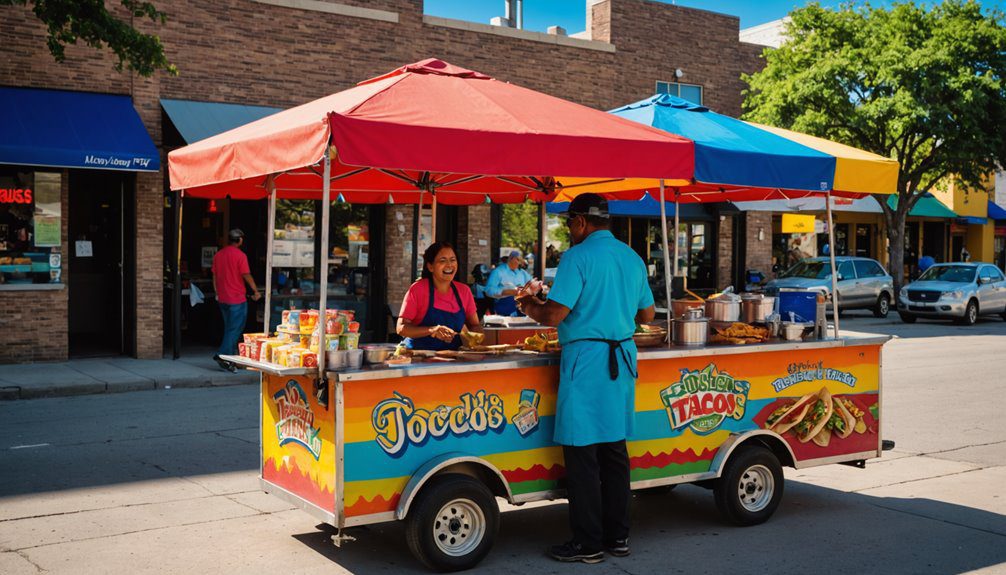If you're considering becoming a street vendor in Houston, you need to understand the importance of a street vendor bond. This bond isn't just a formality; it's a financial safeguard that ensures you're operating within the law and maintaining high standards. Without it, you risk losing credibility and facing potential legal issues. But what exactly does obtaining this bond entail, and how can it impact your business's success? The answers might surprise you, especially as you navigate the unique challenges of the bustling Houston market.
Understanding Street Vendor Bonds

Street vendor bonds are essential for anyone looking to operate a mobile food business or sell goods on the streets of Houston. These bonds serve as a financial guarantee that you'll comply with local laws, regulations, and ordinances while conducting your business.
When you secure a street vendor bond, you're essentially promising to uphold your obligations, which protects both your customers and the city.
Understanding how these bonds work is crucial. When you apply for a street vendor bond, the bonding company assesses your business practices and financial history. If you fail to meet your obligations, customers can file a claim against the bond, and the bonding company may compensate them.
You'll then be responsible for reimbursing the bonding company, so it's in your best interest to operate ethically and legally. Additionally, the bond amount may vary based on your business type and the potential risks involved, similar to how debt consolidator bonds are influenced by credit scores and financial history.
In Houston, the bond amount varies based on your business type and the potential risks involved. It's important to research and choose the right bond that suits your needs.
Importance of a Street Vendor Bond
Operating a mobile food business or selling goods in Houston involves a significant responsibility to your customers and the community. A street vendor bond plays a crucial role in helping you meet those responsibilities. It acts as a safety net, ensuring that you adhere to local regulations and standards. This bond protects your customers by guaranteeing that you'll fulfill your obligations, such as delivering quality products and services.
Having a street vendor bond enhances your credibility. When customers see that you're bonded, they're more likely to trust your business. It signals that you're serious about your operations and committed to maintaining a high standard of service. Additionally, it can help you stand out from competitors who may not have this security in place.
Moreover, a street vendor bond can shield you from potential financial losses. If a customer files a claim against you for unsatisfactory services or goods, the bond provides a way to address those claims without causing significant harm to your finances. Furthermore, these bonds ensure compliance with laws that protect both consumers and businesses, reinforcing the importance of ethical practices in the industry.
Legal Requirements in Houston

In Houston, the legal landscape for street vendors is defined by specific regulations that ensure compliance and safety. To operate legally, you'll need to obtain a vendor permit from the City of Houston. This process involves submitting an application, paying a fee, and sometimes providing proof of liability insurance.
It's essential to familiarize yourself with local zoning laws, as some areas may restrict vending activities. You must also adhere to health and safety standards, especially if you're selling food. This might include obtaining a food handler's permit and ensuring your cart or vehicle meets health department regulations.
You should also check if you need any additional licenses based on your specific offerings, like a sales tax permit from the Texas Comptroller. Moreover, you'll need to be aware of the hours and locations where you can operate, as certain city ordinances govern these aspects to minimize disturbances.
Ignoring these requirements can lead to fines or even the revocation of your permit. By staying informed and compliant with these legal obligations, you can ensure a smooth operation as a street vendor in Houston.
Types of Street Vendor Bonds
As you navigate the legal requirements for vending in Houston, understanding the types of street vendor bonds available is vital.
These bonds serve as a financial guarantee that you'll comply with local laws and regulations while protecting your customers and the community.
One common type is the general vendor bond. This bond ensures that you follow all regulations set by the city, such as obtaining necessary permits and paying taxes.
If you violate these terms, the bond can cover any claims against you, helping to maintain your credibility as a vendor.
Another type is the performance bond. This bond specifically guarantees that you'll fulfill your contractual obligations, especially if you're working under a specific vendor agreement.
If you fail to meet these obligations, the bond provides compensation to affected parties.
Lastly, there's the license bond, which is often required when you apply for a street vendor license.
It assures the city that you'll adhere to licensing requirements and regulations. Additionally, securing the appropriate surety bonds can help you avoid potential legal issues and maintain your business operations.
Choosing the right bond is crucial, so make sure to assess your specific needs to protect your business and ensure compliance with local laws.
How to Obtain a Street Vendor Bond

When you're ready to secure a street vendor bond in Houston, the process typically starts with identifying a reliable surety company.
Research different companies and read reviews to find one that suits your needs. Once you've selected a surety, reach out to them to discuss your requirements.
Next, you'll need to complete a bond application. This application usually asks for basic information about your business, including your name, address, and the nature of your street vending activities.
Be honest and thorough; any discrepancies could delay the process.
After submitting your application, the surety company will assess your qualifications. They may check your credit history and business background to determine your eligibility for the bond.
This step is crucial, as it helps them decide the bond amount and terms.
Once approved, you'll review the bond agreement. Make sure you understand all the terms before signing. Additionally, ensure that you are aware of the local regulations that may impact your bond acquisition.
Costs Associated With Vendor Bonds
Securing a street vendor bond involves various costs that you should be prepared for. First, there's the premium, which is the amount you'll pay annually to maintain the bond. This typically ranges from 1% to 15% of the total bond amount, depending on your credit score and the bonding company's terms. If you have good credit, you'll likely pay a lower premium.
Next, consider any application fees that bonding companies may charge. These fees can vary, and it's essential to factor them into your budget.
Additionally, you might need to cover costs for any necessary documentation, such as business licenses or permits, which can also add up.
If you're required to provide collateral or a cash deposit, that's another financial consideration. It's not uncommon for bonding companies to ask for this, especially if you're seen as a higher-risk vendor.
Lastly, keep in mind that renewal costs may arise each year, as bonds typically need to be renewed. Budgeting for these expenses will help ensure you're financially prepared to secure your street vendor bond without any surprises. You may also want to consider the annual bond costs associated with specific regulations in your area to ensure compliance and avoid unexpected fees.
Common Challenges for Vendors

Street vendors often face a myriad of challenges that can impact their success. One of the most significant hurdles is securing a consistent and profitable location. You might find that prime spots are already occupied or come with high competition, making it tough to attract customers.
Weather conditions can also play a role; rain or extreme heat can deter foot traffic, affecting your sales.
Another challenge is managing inventory efficiently. You need to balance having enough products to meet demand without overstocking and risking waste. This requires careful planning and adaptability.
Additionally, dealing with cash flow issues can be daunting, especially during slow sales periods when expenses keep piling up.
Building a loyal customer base takes time and effort. You must find ways to stand out, whether through unique offerings or exceptional customer service.
Lastly, time management can be a struggle, as you juggle cooking, serving, cleaning, and marketing your business all at once. Moreover, understanding the importance of health club bonds can provide valuable insights into protecting your business interests in a regulated environment.
These challenges can be overwhelming, but with the right strategies and determination, you can navigate through them and increase your chances of success as a street vendor.
Maintaining Compliance With Regulations
Navigating the maze of regulations can feel overwhelming for vendors, but staying compliant is crucial for your business's longevity. First, familiarize yourself with local ordinances specific to street vending in Houston. These rules govern everything from where you can set up your stand to health and safety requirements.
Make it a habit to regularly check for updates, as regulations can change.
Next, ensure you have the necessary permits and licenses before you start operating. This might include health permits, business licenses, and, of course, your vendor bond.
Keep copies of these documents on hand and easily accessible, as you may be asked to show them during inspections.
Develop a system for tracking compliance deadlines. Whether it's renewing permits or scheduling inspections, staying organized helps you avoid costly fines.
Consider setting reminders on your phone or using a planner.
Lastly, engage with other local vendors and join community forums. Networking can provide valuable insights into best practices and regulatory changes you might've missed. Additionally, understanding the importance of surety bonds can help you navigate compliance requirements effectively.
Resources for Houston Vendors

A wealth of resources is available to help Houston vendors thrive in the bustling marketplace.
First, you should connect with local organizations like the Houston Food Truck Association and the Greater Houston Restaurant Association. These groups offer networking opportunities and valuable insights into industry trends.
Next, consider tapping into the Small Business Administration (SBA) for guidance on securing funding and improving your business operations. Their resources can help you navigate loans, grants, and other financial support options tailored for small businesses.
Don't forget about the city's official website, where you can find information on permits, licenses, and essential regulations. Staying informed is crucial for your success.
Additionally, online platforms like SCORE provide free mentoring and workshops specifically designed for small business owners. These can be great for honing your business skills and developing effective strategies.
Lastly, engage with social media and local community groups. Building relationships with fellow vendors and customers can greatly enhance your visibility and customer base.
Conclusion
In conclusion, obtaining a street vendor bond in Houston is a vital step for your business. It not only helps you comply with local regulations but also builds trust with your customers. By understanding the requirements and navigating the process effectively, you can enhance your credibility and protect your interests. Stay informed about regulations and challenges, and you'll be well on your way to thriving in the competitive street vending landscape.


